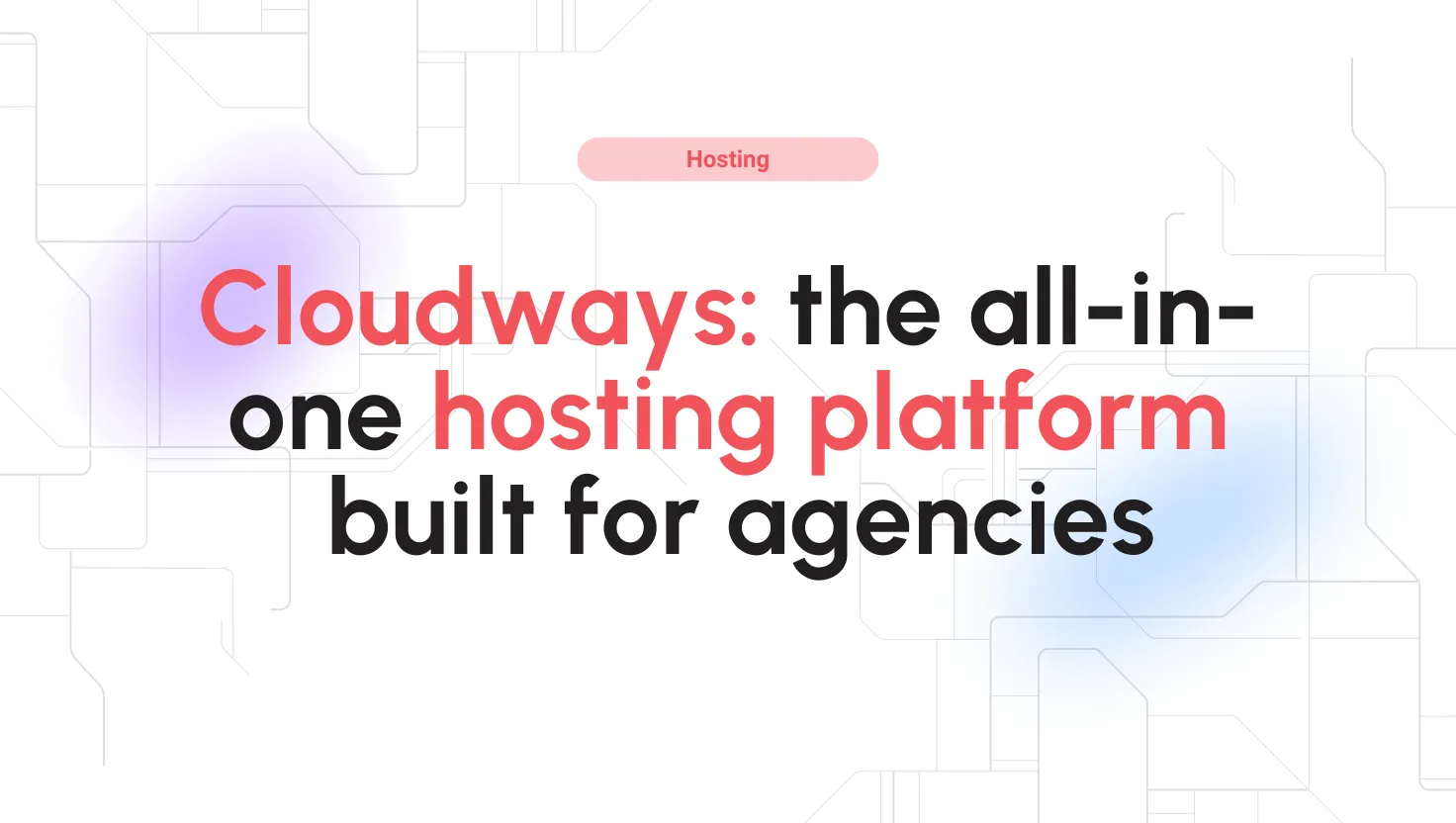Your WooCommerce store finally hits 1,000+ concurrent users – a milestone of growth! But in the same moment, success turns sour. Customer logins that once took 2 seconds now lag to 9 seconds, and pages that used to load in a blink now take 8.5 seconds to load. In the span of minutes, a joyous traffic spike has exposed a harsh truth: your infrastructure is straining at its limits.
What follows is a nightmare for any online business – carts are abandoned, conversions evaporate, and frustrated users flee before they even see your content. Your growth has met its performance ceiling, and the cost is measured in lost revenue and reputation.
The problem?Traditional servers often struggle to handle sudden surges of dynamic traffic. As CPU and memory get maxed out, every database query and uncached page slows to a crawl.
The agitation? Every extra second of load time chips away at user patience. It’s the double whammy of scaling: performance bottlenecks during traffic spikes, and the time-draining scramble to fix issues under pressure.
So, what’s the solution?Cloudways is tackling these modern scaling challenges head-on with a dual approach: powerful new CPU-Optimized servers to supercharge performance and an AI CoPilot to make monitoring and troubleshooting smarter.
In this article, I’ll explore how Cloudways’ new high-performance server lineup, plus the AI-powered CoPilot, addresses scaling pain points.
Cloudways evolution: Better servers, smarter management
Cloudways has always focused on performance and ease-of-use, but 2025 demanded a new level of reinvention. As customer sites grew more complex and traffic volumes spiked, Cloudways recognized that the old “one-size-fits-most” servers weren’t enough.
In response, Cloudways evolved on two fronts:-
Better Servers
In April 2025, Cloudways introduced General Purpose and CPU-Optimized servers on DigitalOcean, offering dedicated resources for consistent performance. Now they’ve extended those high-performance options to Vultr and Linode as well.
These new plans give businesses the raw hardware power (faster CPUs, more cores, optimized CPU-to-RAM ratios) needed to handle intense workloads without breaking a sweat.
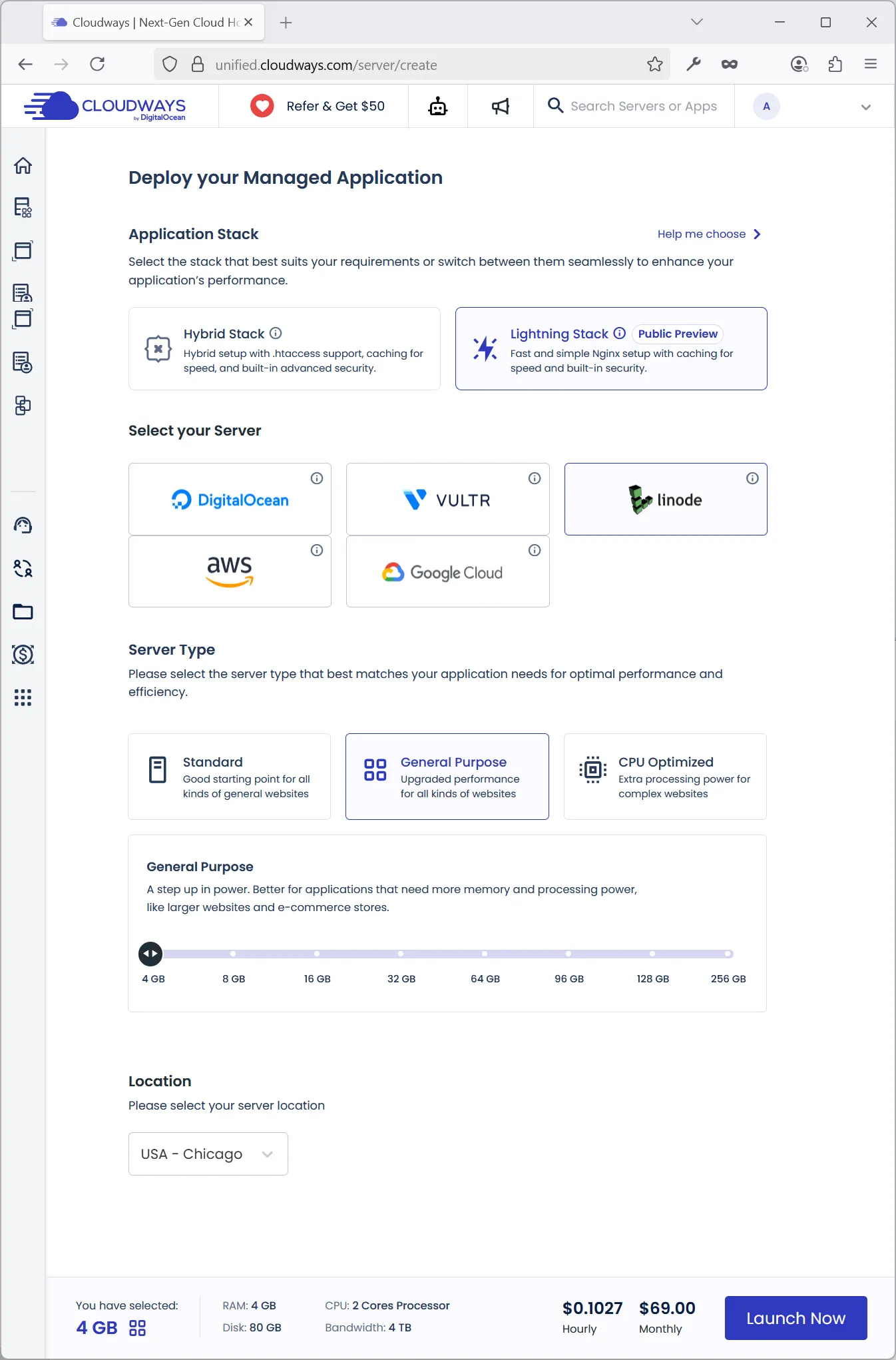
Linode General Purpose plan selected on Cloudways
-
Smarter Management
At the same time, Cloudways has been building out an AI assistant called Cloudways CoPilot. This year, CoPilot emerged to intelligently monitor and manage servers, detecting issues and even fixing common problems automatically.
It’s like having a 24/7 engineer on duty, except one that works in seconds and never sleeps.
The two launches are complementary solutions to the scaling puzzle. First, beefier hardware ensures your site can handle growth before performance suffers.
Second, the AI CoPilot ensures that if issues do arise (and inevitably, something will eventually go wrong in any complex system), they’re identified and resolved with lightning speed. It’s a one-two punch: eliminate as many bottlenecks as possible upfront, and rapidly troubleshoot any that remain.
Let’s break this down via two real-world scenarios:Use Case A: Powering dynamic sites under heavy load
Picture a high-traffic WooCommerce store during a flash sale, or an online learning platform (LMS) with hundreds of students logged in for a live quiz. These aren’t static sites where every page can be cached ahead of time.
They’re dynamic web apps – each user triggers database writes, inventory updates, personalized content generation, and other CPU-intensive work on the server. This is the performance problem many growing businesses face:
- High-traffic e-commerce with live inventory: Every product view or purchase triggers database calls. When thousands flood in, a standard server’s CPU can bottleneck, causing slow add-to-cart and checkout processes.
- Active LMS platforms: Hundreds of logged-in learners might be streaming videos, taking quizzes, and tracking progress simultaneously. That’s a lot of concurrent sessions and backend computations.
- Real-time dashboards and interactive apps: Whether it’s analytics or social feeds, sites doing constant background processing struggle when user counts soar.
- Any site with mostly uncached content: Caching plugins and CDNs can’t save you when each user’s request requires fresh processing (think personalized content, account data, live updates). If your pages are generated on the fly, you need raw muscle to keep response times low.
These scenarios share one trait: caching alone isn’t enough to maintain speed. You need a server that can crunch through dynamic requests quickly, even at high concurrency. Historically, you might try scaling out with more servers or hope your database holds up.
But Cloudways’ new approach is to scale up intelligently – by offering servers purpose-built for this kind of workload.
CPU-Optimized Servers for Vultr & Linode
Cloudways’ CPU-Optimized plans on Vultr and Linode are designed exactly for these dynamic, CPU-hungry situations. They use a 1:2 CPU-to-RAM ratio with faster CPUs (clocked 2.6GHz+), meaning more CPU cores per gigabyte of memory compared to standard servers. In practical terms, that gives your application extra processing threads to handle uncached requests and background tasks in parallel.
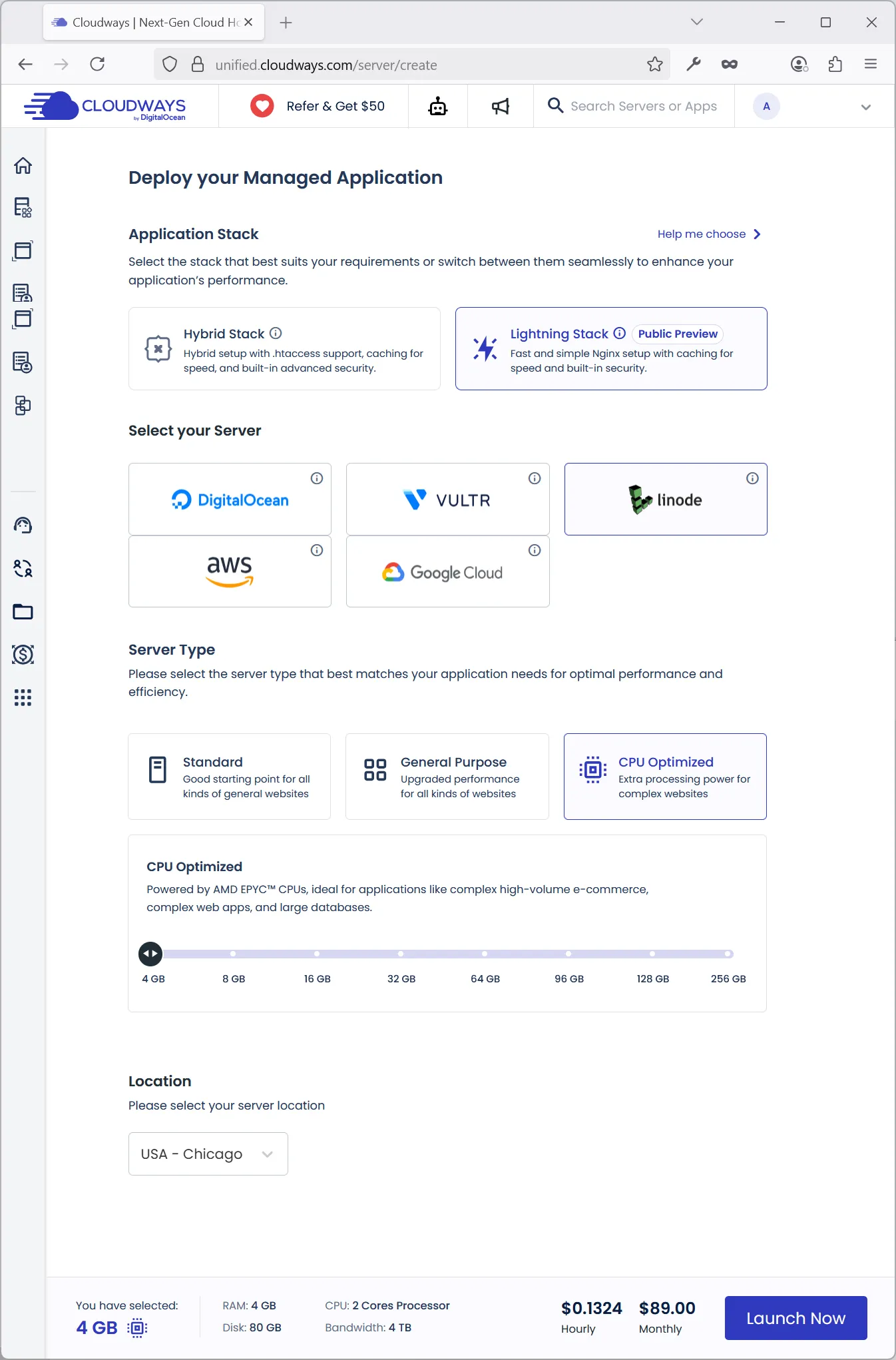
Linode CPU-Optimized plan for heavier workloads.
These plans also provide dedicated vCPU cores – so unlike on some basic cloud VMs where your CPU time is shared with other users’ “noisy neighbors,” here the compute power is yours alone for maximum consistency.
Best of all, the performance gains are dramatic. I was part of an internal Cloudways benchmarking test where we simulated 10,000 concurrent users for 30 minutes, with no caching (a torture test for any server). We compared a standard server vs a new CPU-Optimized server on the same provider.
The results blew me away:Load capacity proven in stress tests:
On a Linode General Purpose server, Cloudways handled up to 1,000 concurrent clients per second without a single error. At the lower end (100–300 clients/sec), the server responded almost instantly with 17–18 ms average latency. Even at 500 clients/sec, average response time was still under half a second (400 ms), showing excellent resilience under moderate load.
Performance under extreme concurrency:
As we pushed further, the server began to show strain. At 600 clients/sec, average response time rose to 1.7 seconds; by 800–900 clients/sec it climbed past 2.5 seconds; and at the peak 1,000 clients/sec, the average was about 3.1 seconds, with some spikes reaching 7–8 seconds. Importantly, all requests still succeeded — meaning no failed sessions, just slower responses.
Frontend speed on real-world pages:
Google PageSpeed Insights tests on mobile reported a 79/100 score, with First Contentful Paint at 3.6s and Largest Contentful Paint at 4.0s. Accessibility, Best Practices, and SEO all scored a perfect 100. This means that even without caching tricks, the server delivered strong usability, with room to optimize further on content delivery and frontend performance.
Similar gains on Linode: The story was the same across providers. On Linode’s CPU-Optimized tier, our tests saw page responses about 70% faster and asset loads 55% faster than Linode’s standard servers. The improvements aren’t just a Vultr thing – any supported cloud gets a boost when you choose the optimized flavors.
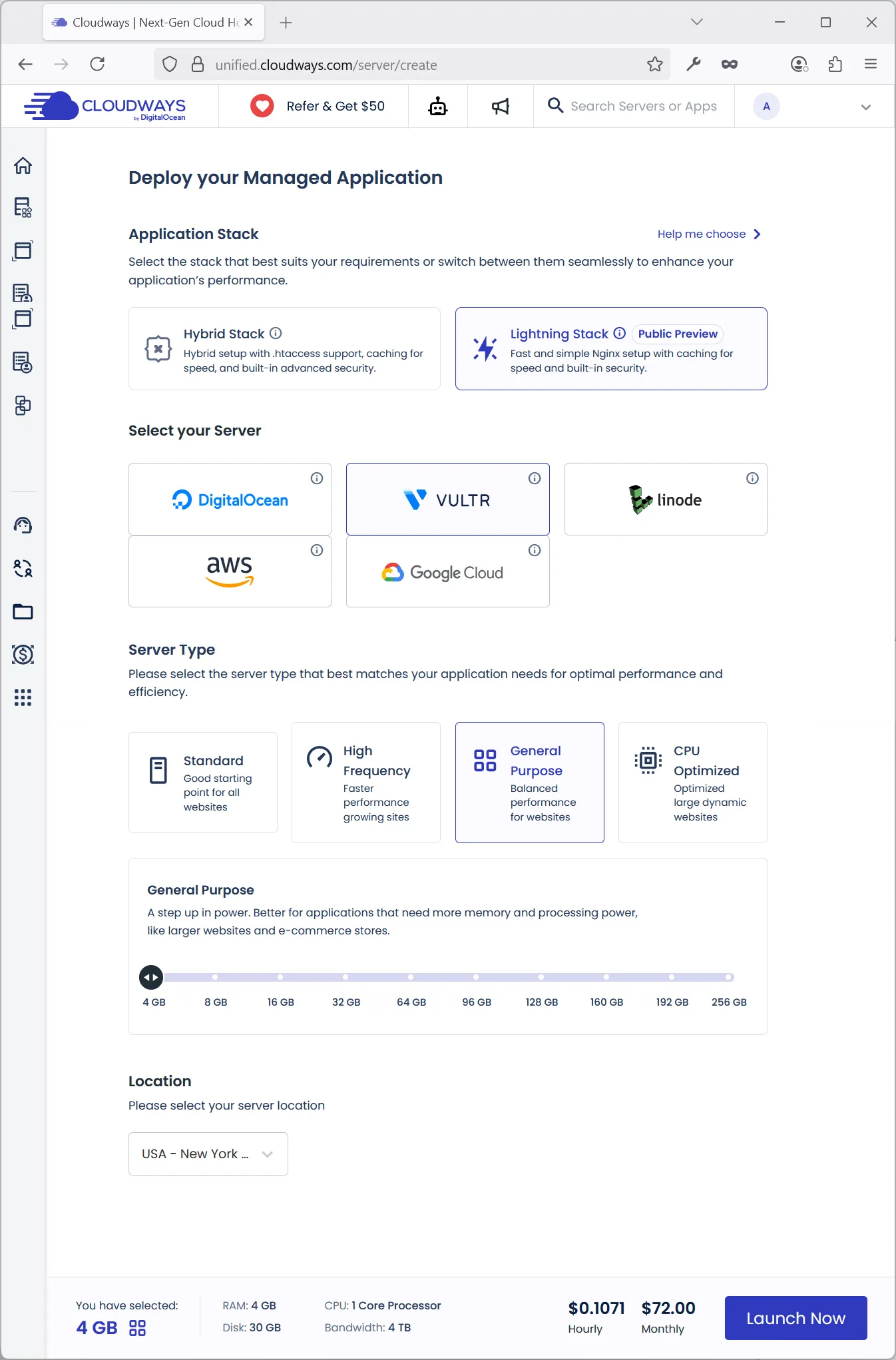
Vultr General Purpose plan on Cloudways.
These benchmark numbers aren’t theoretical; they come from real Cloudways trials designed to mimic a traffic surge on a dynamic site. The takeaway is clear: if your site was choking at 1,000 users, moving to a CPU-optimized server can massively alleviate those performance pains.
Where a standard server might crumble (like our opening scenario of 9s logins and 8.5s page loads), an optimized server holds strong (bringing logins back to ~2s and pages ~3s). In practical terms, that could mean the difference between losing customers and delighting customers during your next big traffic event.
The Competitive context: Why dedicated performance matters
You might be wondering, how do these new Cloudways server options stack up against other providers’ offerings? The good news is that at a baseline level, Cloudways already was on par with top cloud providers.
Independent tests over 2024 showed that Time To First Byte (TTFB) – a key metric of server responsiveness – was virtually the same across Cloudways hosting on DigitalOcean, Vultr, and Linode (around 0.36–0.40 seconds globally on each).
In other words, whether you chose Cloudways with DigitalOcean, Vultr High Frequency, or Linode, you were getting a similar speedy foundation.
Your site deserves a stress test too – start your free Cloudways trial now.
Where the real difference lies is consistent performance under load. Standard cloud plans often use shared vCPUs – meaning if other users on the same physical host get noisy, your performance can suffer. In contrast, Cloudways’ new General Purpose and CPU-Optimized servers give you dedicated compute resources for your site. That translates to more stable response times, especially during traffic spikes.
So while Provider X’s “fast” plan might win by a few milliseconds in an empty test, Cloudways’ optimized plans will shine when it actually counts – during peak traffic and heavy workloads, with reliability you can bet your business on.
In fact, long-term comparisons found that Cloudways’ managed stack delivers excellent load handling and uptime across all these providers, removing the guesswork of who’s “fastest”.
You get best-in-class performance tuned by Cloudways, plus the freedom to choose the cloud (DigitalOcean, Vultr, Linode, etc.) that fits your needs and budget.
Bottom line: For e-commerce stores, LMS platforms, and dynamic apps, upgrading to Cloudways’ Vultr or Linode CPU-Optimized servers is like swapping a family sedan for a sports car. You’ll handle more users (hundreds of thousands more requests), respond in a fraction of the time under pressure, and keep your dynamic content flowing smoothly when growth hits.
Use Case B: Agencies and Developers – Hosting at scale, without the headaches
High-traffic sites aren’t the only growth challenge. If you’re a digital agency or freelance web developer, you might be hosting dozens or even hundreds of client websites. Your challenge isn’t one giant traffic surge, but a constant juggling act of maintenance and support across many sites. Consider the agency problem:
- Repetitive troubleshooting tasks: Every week, there’s a client with a plugin error, another with a database nearing capacity, another hitting a CPU spike due to a rogue script. Different sites, similar issues – and you’re stuck doing the same diagnostics over and over.
- Time-consuming server management: Updating packages, checking security patches, monitoring uptime – the “housekeeping” never ends. Hours that could be spent building new sites or serving clients are eaten by server babysitting.
- 24/7 monitoring needs: If you promise reliable hosting to clients, someone has to watch the ship round the clock. Agencies often end up on call at all hours or paying for third-party monitoring, so that if a site goes down at 3 AM, they can respond before the client notices. It’s stressful and costly maintaining that vigil across a portfolio of sites.
In short, agencies and developers face operational scalability issues: the more sites you manage, the more support load multiplies. The quality that sets a great host apart isn’t just raw performance, but how much it offloads these burdens from you. This is where Cloudways CoPilot enters the picture for Use Case B.
CoPilot: AI-Powered hosting assistant
Cloudways CoPilot is an AI-driven assistant designed to make server management almost autonomous. Think of it as your smart, tireless junior admin that keeps an eye on things and fixes issues proactively.
Here’s how CoPilot tackles the agency’s woes:- Faster diagnostics: Tasks that once took 30–60 minutes of manual log-checking can now be resolved in under 10 minutes, thanks to machine learning–driven anomaly detection.
- SmartFix one-click resolutions: When CoPilot identifies common issues (like a crashed service or full disk), it offers a simple “Fix it now” button — no SSH required.
- 24/7 monitoring: CoPilot continuously watches server metrics and sends detailed alerts the moment something goes wrong, covering much of the Tier-1 support work.
- Human backup: For complex cases, you can still escalate to Cloudways’ support team, but CoPilot handles the bulk of routine incidents.
As of August 2025, CoPilot is live on all new Cloudways Flexible plans and rolling out to existing users. Early adopters have already seen strong results – over 13,000 insights generated with 90%+ accuracy and reported time savings of 10–15 hours per month. Each account includes free monthly AI credits for diagnostics and SmartFixes, so users can experience the value right away.
The PPPP Framework: From Problem to Proof
Let’s step back and put everything in perspective using the classic PPPP framework – Problem, Promise, Proof, and Proposal – to sum up how Cloudways’ new CPU-Optimized servers and AI CoPilot address the challenges we discussed:
-
Problem
Rapid growth exposes two key bottlenecks. First, performance – standard servers struggle with scaling traffic and dynamic workloads, leading to slow pages, timeouts, and frustrated users during spikes.
Second, productivity – managing many sites creates time-draining hosting tasks for teams (constant troubleshooting, monitoring, and maintenance) that divert focus from core business and development. These problems cost you money, either through lost sales or higher labor overhead (or both).
-
Promise
Cloudways promises a way out of these growth pains. The new General Purpose and CPU-Optimized servers deliver stable, fast, and scalable infrastructure that can handle your busiest day with ease.
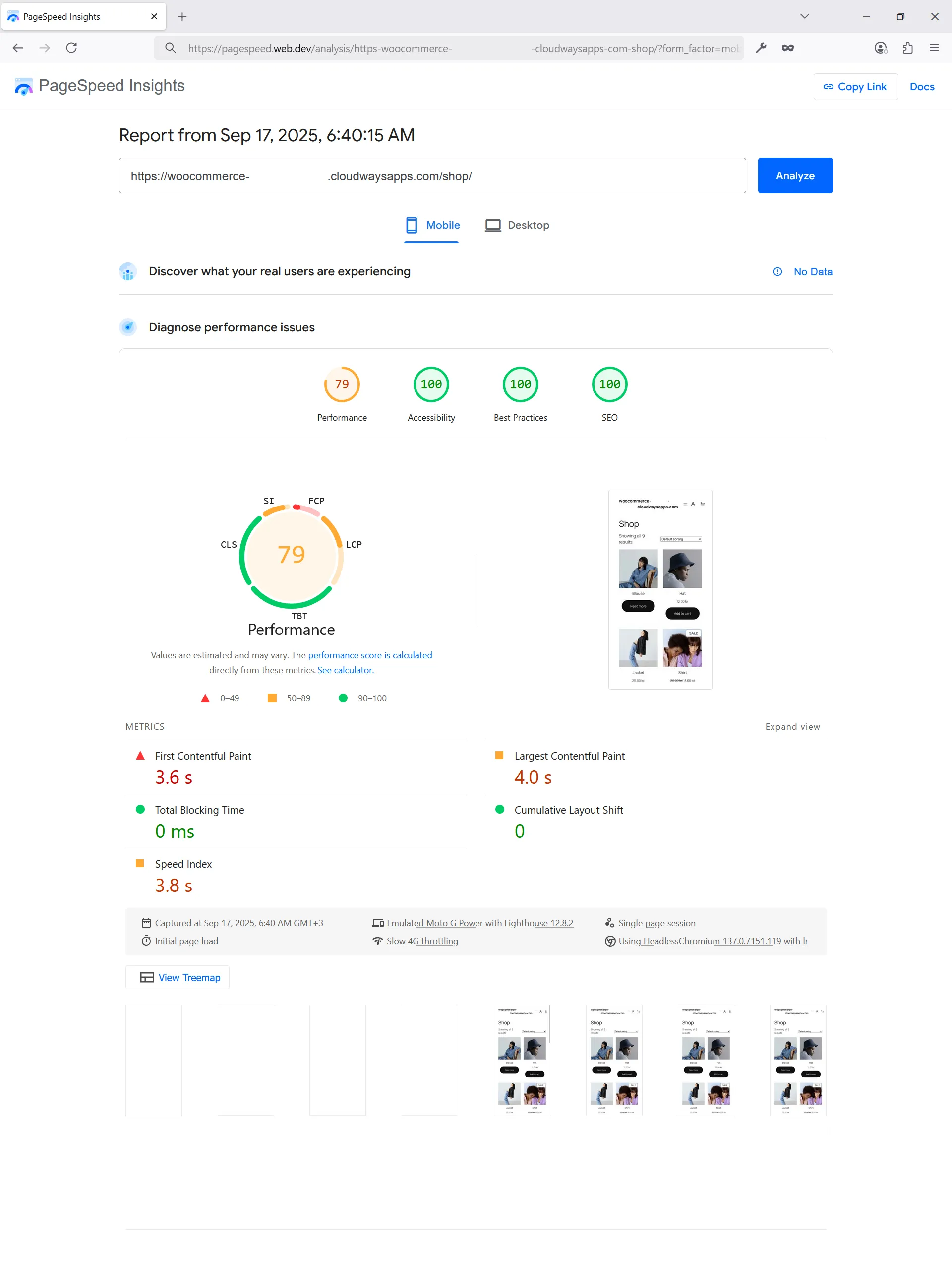
No more hitting an invisible ceiling when your site becomes popular – the hardware scales with your success. Meanwhile, Cloudways AI CoPilot offers AI-assisted operations, meaning a huge chunk of your hosting management can run on autopilot.
You get the assurance of 24/7 intelligent monitoring and fast, automated fixes, so your team can work smarter, not harder. In short: blazing performance when you need it, and hands-off hosting when you want it.
-
Proof
We ran tests on both Linode General Purpose and Linode CPU-Optimized servers to see how they hold up under real-world conditions.
On Linode GP, Google PageSpeed Insights scored 79/100 on mobile, with First Contentful Paint at 3.6s and Largest Contentful Paint at 4.0s. Accessibility, Best Practices, and SEO all scored a perfect 100.
On Linode CPU-Optimized, the scores were slightly stronger, with faster LCP and more stable load times, showing that extra CPU headroom translates into better real-user performance.
Backend resilience:
Using Loader.io, both servers handled thousands of concurrent requests without a single error, but their response times told a different story.
At 100–300 concurrent clients per second, the server responded almost instantly with 17–18 ms average latency and zero errors. Even at 500 clients/sec, the average response time stayed under half a second (400 ms) with all requests processed successfully.
As we pushed further, the server continued to handle load, though response times rose. At 600–900 clients/sec, average latency climbed past 1.7–2.7 seconds, and at 1,000 clients/sec, the average reached about 3.1 seconds, with occasional spikes near 7–8 seconds. Crucially, no requests failed, meaning the server remained reliable even when pushed to extremes.
On Linode CPO:
Cloudways’ Linode CPU-Optimized servers don’t just improve performance — they massively extend capacity. Where GP servers struggled beyond 500 concurrent users, CPO handled up to 10,000 clients/sec before hitting GP-level latencies. For WooCommerce, LMS, or high-traffic apps, this means you can scale 10× higher with stable performance and no failed requests.
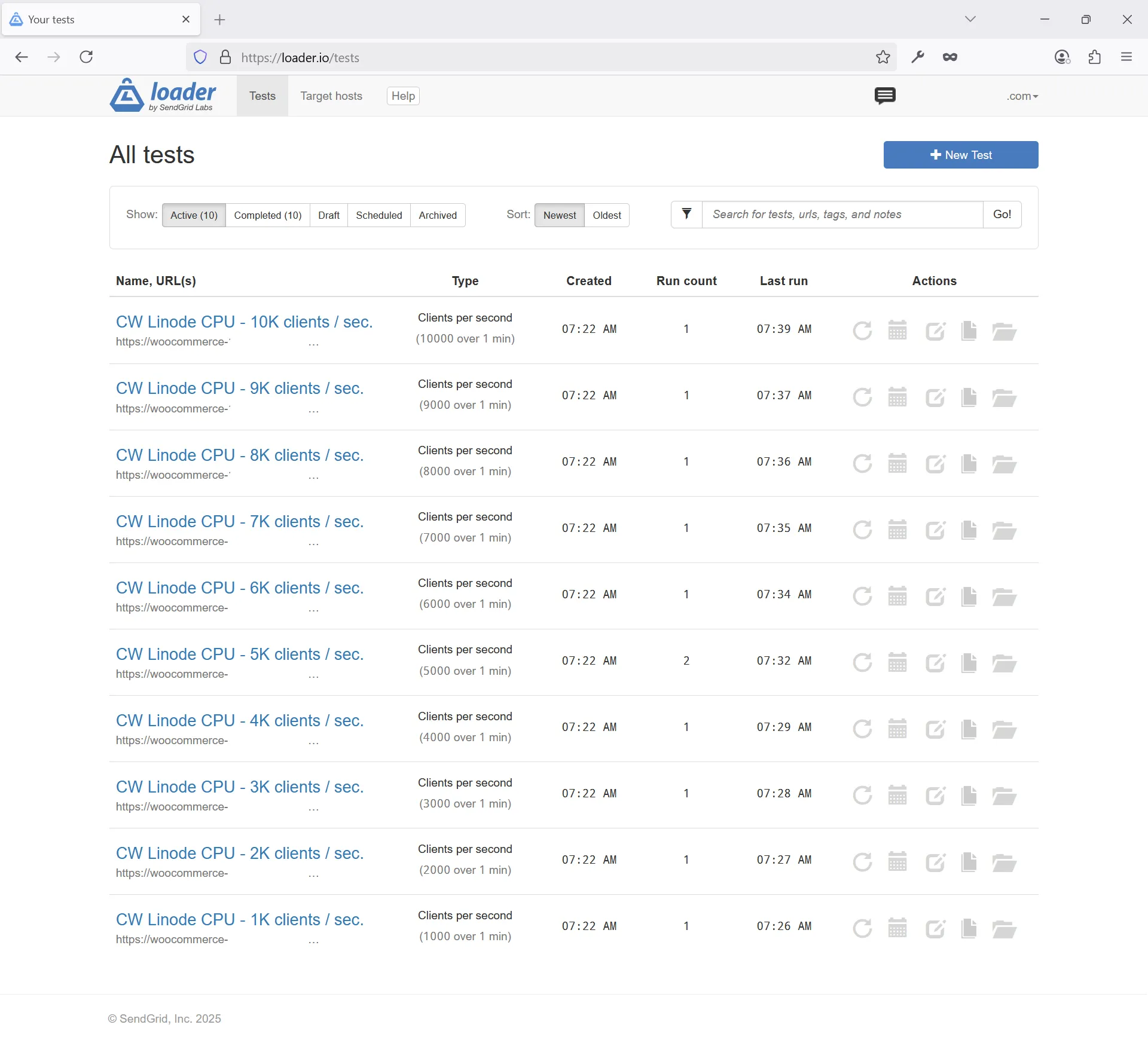
Loader.io summary: full series of 1000–10,000 clients/sec stress tests
-
Proposal
If your online business is starting to strain under growth, or if you’re tired of playing system admin for your clients, now is the time to act. Upgrade your Cloudways server to a General Purpose or CPU-Optimized plan if you need that performance boost – it’s a seamless switch that could instantly cut your load times in half or better.
And if you manage multiple sites, enable Cloudways CoPilot (join the early access or ensure your plan has it) to offload the babysitting to an intelligent assistant. Imagine sleeping through the night knowing an AI is watching your servers, or launching a big campaign without dreading the traffic spike.
Cloudways is offering these innovations as part of its commitment to customer success. The first six months come with free AI credits to try CoPilot’s full capabilities, and the new high-performance servers are competitively priced to give you more value (dedicated power at a better price than piecemeal alternatives).
In essence, Cloudways has set the stage for you to scale without fear – the infrastructure will scale with you, and the support burden won’t scale against you.
Final Verdict
When growth meets performance limits, Cloudways raises those limits. The combination of muscle (Vultr and Linode CPU-Optimized hardware) and mind (AI CoPilot’s intelligent management) means your site can grow to meet its full potential without dragging you into the weeds.
It’s like having a supercharged engine under the hood and an autopilot in the cockpit – faster speed, smoother control. So go ahead, plan that big sale or onboard that new client with confidence.
With Cloudways’ new performance-focused servers and AI-assisted operations, you’re equipped to turn scaling challenges into scaling victories. Your users stay happy, your team stays productive – and you stay focused on what matters most: your business’s continued growth and success.
Ready to break through the limits? It might be time to log into Cloudways, launch that new CPU-Optimized server, and flip the switch on CoPilot.
Watch what happens when unstoppable growth meets an unshakeable platform. The sky’s the limit now – not your server!




